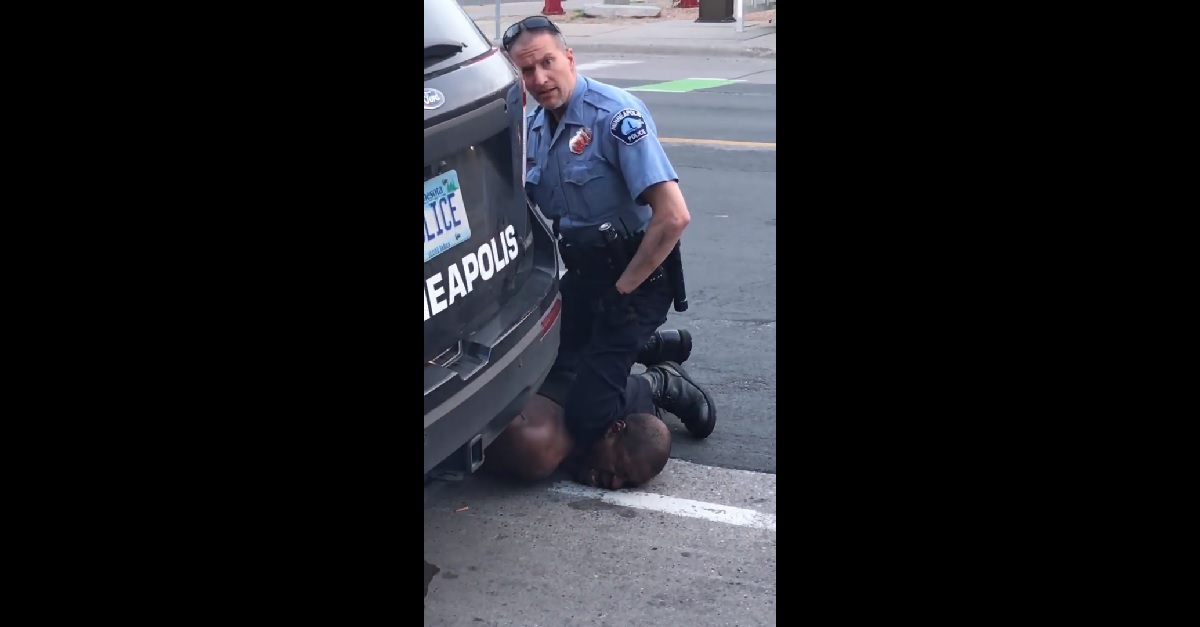
Republicans in Ohio advanced a bill on Thursday that might, depending on interpretation, criminalize the recording of police officers. Perhaps coincidentally, the legislation moved forward on the eve of convicted murderer and former Minneapolis police officer Derek Chauvin‘s sentencing hearing for the May 2020 killing of George Floyd.
Ohio House Bill 22 would broaden the definition — and likely expand the use — of obstruction of justice laws in the Buckeye State by criminalizing the “failure to follow a lawful order from a law enforcement officer” or for “diverting a law enforcement officer’s attention.”
Another vague section of the bill makes it a crime to:
Interfere with or obstruct a law enforcement officer in a manner that does any of the following:
(a) Inhibits or restricts the law enforcement officer’s control of a subject or detainee;
(b) Deprives the law enforcement officer of control of a subject or detainee;
(c) Without the consent of the law enforcement officer, enters, or places an object or substance into, a space around the law enforcement officer that is large enough that the law enforcement officer cannot reach a person outside of the area.
Civil Rights and First Amendment advocates are aghast at the measure and submitted over 100 separate testimonials against the fast-moving law before the GOP-controlled House Criminal Justice Committee okayed the new restrictions by an 8-5 party line vote.
While Democrats, progressives, racial justice advocates and free speech defenders opposed the measure, law enforcement organizations in Ohio offered strong support, claiming it is a necessary effort to make work easier for police officers.
They also argue that it would make dangerous situations safer for the public as well.
According to Cleveland ABC affiliate WEWS, the Ohio Prosecuting Attorney’s Association, the Buckeye Sheriff’s Association, the Ohio Highway Patrol and the Fraternal Order of Police are big proponents of the proposed law.
Opponents say the measure — and/or others like it — could have been used to criminalize and prosecute someone similar to Darnella Frazier, the teen who recorded cell phone video of Floyd’s death last summer, or the people who stood near her and told the police to ease their grip on George Floyd, Jr.
Frazier’s video showed Chauvin looking toward those gathered to witness the situation and away from Floyd — thus “diverting” Chauvin’s attention away from Floyd, to use a word contained within the new Ohio bill.
It’s unclear if Floyd’s death was the specific motivating factor behind the Ohio Republicans’ efforts to draft the measure — but language in the bill sounds similar to comments Chauvin’s attorney made at the start of his murder trial. And, to the surprise of no one, the debate surrounding the bill’s language has leaned heavily on the Floyd case as both an interpretive yardstick and as a flash point for criticism.
One lawmaker opposed to the bill noted that it could criminalize the attempts of bystanders to save the life of a detainee or suspect who was dying in police custody.
“One person’s taunt is another person’s attempt to save a life,” said Rep. Tavia Galonski (D-Akron) in a comment reported by WKSU radio. Galonski was referencing language in the bill that would make it a crime to “taunt” the police.
Several others who have spoken out about the bill were of similar thought, but the bill’s proponents disagreed.
Ohio Prosecuting Attorneys Association Director Lou Tobin told the Columbus Dispatch that he didn’t “think” the bill would criminalize recording an officer as a side effect of its facial language.
“I think what the bill prohibits is some sort of physical interference,” Tobin said — but his language admitted a degree of guesswork.
Former Columbus Police Chief Thomas Quinlan said he believed the bill criminalized “mentally interfering with an officer.”
“If an officer does not have that person yelling at him, maybe they have the actual time to look at what’s in front of them – the individual on the ground – and realize the actual mistake, the tragic fatal mistake they were making,” Quinlan said, per the Dispatch.
“Instead of seeking to heal the rift between our communities and our law enforcement, HB 22 further sows the seeds of fear by attempting to criminalize the right to protest,” Ohio Legislative Black Caucus President State Rep. Thomas West (D-Canton) said on Thursday. “This bill, not to mention similar legislation pending before this body, takes Ohio in the opposite direction of progress. HB 22 will not promote the safety and security of our officers and of individuals exercising their First Amendment rights. It will only create more tension and potential for conflict.”
“Just seven proponents testified in favor of HB 22, while more than 100 opponents spoke up against it,” the legislator continued. “This is a pattern we have seen far too many times from the General Assembly. We must start listening to what Ohioans are asking us to do instead of forcing unpopular and dangerous bills through the legislative process over their objections.”
One of the bill’s sponsors, Rep. Jeff LaRe (R-Violet Township), said the bill didn’t directly criminalize recording but took the fierce debate under advisement.
He said he was “all for” addressing the opponents’ concerns. But that was back in April. The original bill has been substituted with a version which removes the language about “taunting” a law enforcement officer, but most of the original language about “diverting” an officer’s attention remains.
Aaron Keller contributed research to this report.
[image via Facebook video screen capture]